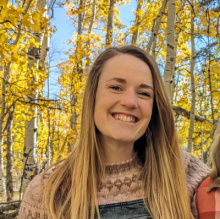
Mariama Dryák-Vallies - Director
mariama.dryak@colorado.eduMariama Dryák-Vallies (she/her) is the Director for the Polar Science Early Career Community Office (PSECCO) and co-PI for the ADVANCEing FieldSafety program hosted by the Cooperative Institute for Research in Environmental Sciences (CIRES) at the University of Colorado Boulder. Mariama grew up on a farm in west-central Wisconsin before heading east to earn her B.A. in physical geography and archaeology at Durham University (UK) and a M.S. in Earth and Climate Sciences at the University of Maine through her research related to Antarctic glaciology, climate, and ice-ocean interactions. During graduate school she was actively involved in advocating for polar early career scientists as a board member and co-chair of the United States Association of Polar Early Career Scientists (USAPECS), and as a project group member and national committee representative for APECS international. Mariama is passionate about working towards building welcoming and safe Earth and polar sciences spaces for all—and strives to center that in all the work that she does. Outside of work, she can often be found pursuing type 2 fun in snow and mud, fly fishing, playing board games, or reading with her rad cats - Franklin and Oliver!
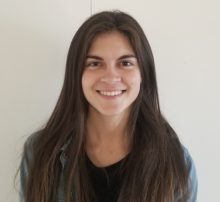
Madison Payne - Events Coordinator
Madison Payne (she/her) is a student research experience coordinator with the CIRES Center for Education, Engagement and Evaluation and support staff with the Polar Science Early Career Community Office. Madison grew up in the Northwest Indiana suburbs of Chicago before moving to Ann Arbor to earn her B.S. in Earth and environmental science at University of Michigan. She then moved out west to pursue a M.S. in geochemistry at New Mexico Institute of Mining and Technology. Throughout her academic career, she has been involved in numerous STEM education and outreach programs, including Science Olympiad, regional and state science and engineering fairs, and numerous environmental education programs while working at Indiana Dunes National Park. In the year following her master’s program, she worked with Northern Illinois University’s BELONG in STEM scholarship program as a research assistant and peer group facilitator for low-income STEM undergraduate students. Madison is passionate about promoting social support and fostering a sense of belonging for students and early career professionals throughout the earth sciences.
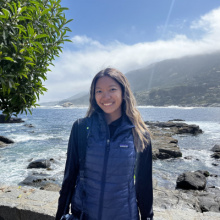
Rose Leeger - Social Media Strategist
Rose Leeger (she/her) is a PhD student assisting with social media outputs for the PSECCO community. Her main research involves studying Antarctic fish ecology and linking together policy and conservation management practices to inform international fisheries. She holds three undergraduate degrees in Marine Biology, Environmental Science, and Biology from Nova Southeastern University. and was able to conduct research in Alaska, the Everglades, and the Galapagos Islands. Rose is involved in APECS (the Association of Polar Early Career Scientists) and SCAR (the Scientific Commitee on Antarctic Research) to work towards bridging communities for all levels of researchers. She strives to leverage different aspects of media to best showcase opportunities for polar researchers all around the globe. You can find her on Instagram @researcherose to see her latest Antarctic outreach, or to check out her cute cat, Peanut.
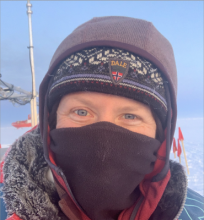
Anne Gold - Advisory Board, PI
anne.u.gold@colorado.eduDr. Anne Gold (PI) (she/her) is a paleoclimatologist by training and Director of the Education and Outreach (E&O) Program at CIRES. Anne brings over a decade of experience in envisioning, developing and implementing education and outreach opportunities for scientists, educators, students and the public; much of her work has focused on polar regions. She is committed to supporting early career scientists, through professional training series and her leadership of the NSF-funded REU program. She co-leads the MOSAiC Coordinating Office and the Navigating the New Arctic Community Office.
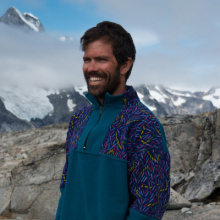
Bradley Markle - Advisory Board, co-PI
bradley.markle@colorado.eduDr. Bradley Markle (co-PI) (he/him) is an early career Assistant Professor in Geological Sciences at the University of Colorado and Fellow at INSTAAR. His research is in paleoclimate dynamics in the high latitudes, with a focus on geochemical records in ice sheets. He is the Associate Director of the Juneau Icefield Research Program (JIRP), an expeditionary earth science summer school that introduces undergraduate students to polar field research. He was a co-founder of the early career development organization Ice Core Young Scientists (ICYS) and sat on the Executive Committee of International Partnerships in Ice Core Sciences (IPICS).
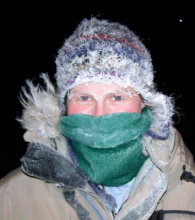
Bec Batchelor - Advisory Board, co-PI
Dr. Rebecca (Bec) Batchelor (co-PI) (she/her) is a polar atmospheric researcher by training, having spent several years in the Antarctic and Canadian Arctic, and has spent the last decade focused on early career scientist professional development and diversity. Her passions are building community, making connections, and empowering the next generation of scientists. She is a co-lead of the GEO-REU network, a national network of leaders of research experiences for undergraduates and former director of the Significant Opportunities for Atmospheric Research Science (SOARS) program, as well as a lead and collaborator on several projects focused on supporting leadership and career development for early career scientists and faculty.
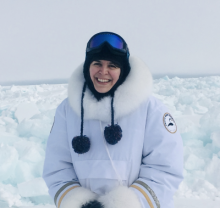
Natasha Haycock-Chavez - Advisory Board
Natasha (Tash) Haycock-Chavez (she/her) is the Network and Outreach Manager at the Exchange for Local Observations and Knowledge of the Arctic (ELOKA). In this role, Tash works with Indigenous partners and researchers to prioritize Indigenous research needs and Indigenous data sovereignty. Prior to this, she worked as the Community Engagement and Outreach Coordinator for the Arctic Data Center, where she worked to connect researchers across a broad diversity of disciplines. Tash received an MA in Geography from Memorial University in Newfoundland, where her research focused on Indigenous-led conservation using GIS spatial analysis and a collaborative community-led approach. Part of her research emphasized how Indigenous research methodologies and self-determination can be integrated into conservation planning, as well Arctic research in general.
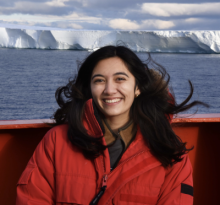
Asmara Lehrmann - Advisory Board
Asmara Lehrmann (she/her) is a PhD student at the University of Houston, Texas, where she researches the paleoclimate of Thwaites Glacier and surrounding glaciers through the sedimentary record, supported by the NSF Graduate Research Fellowship. She holds a BS in Geology from Trinity University in San Antonio, Texas, where she completed an undergraduate thesis on the effects of sea level and climate change on hurricane intensity and severity in the Gulf of Mexico over the last 12,000 years. Being half Indonesian, Asmara's awareness of sea level rise and flooding impacts on her family inspired her to explore the major drivers of sea level change.
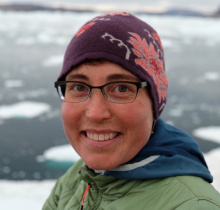
Twila Moon - Advisory Board
Dr. Twila Moon (she/her) is Deputy Lead Scientist and Science Communication Liaison at the National Snow and Ice Data Center. Moon is an expert in glaciology and related system science particularly focused on Greenland and the Arctic. She does extensive work in science communication, including connecting with policymakers, and examples of Moon’s experience include Congressional testimony and briefings, synthesis product development for nonscientists, and one of the lead editors for the annual Arctic Report Card.
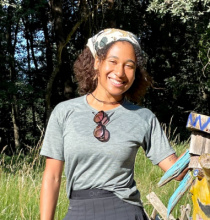
Emma Robertson - Advisory Board
Emma Robertson (she/her) is a PhD student in Physical Oceanography at the Alfred Wegener Institute and Ludwig Maximilian University of Munich where she studies causes of salinity changes in the Southern Ocean using seawater isotopes to trace the impact of melting ice masses on the ocean’s salinity. She has an MS in Geography from Pennsylvania State University where she was an NSF Graduate Research Fellow. She also earned a BS in Environmental Science and BA in Geography from UMass Amherst. Previous research projects include using water isotopes from ice core records to study atmospheric rivers and ice sheet-climate interactions in West Antarctica. Emma’s upbringing in Los Angeles, CA and Melbourne, Australia fostered her interest in global climate change impacts and international environmental justice issues.
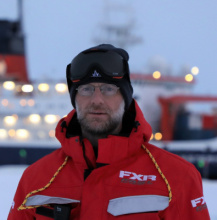
Matthew Shupe - Advisory Board
Dr. Matthew Shupe (he/him) is a senior research scientist at CIRES and NOAA. He has been engaged in Arctic field-based research for 25 years, including projects in Alaska, Northern Canada, the Greenland Ice Sheet, and across the Arctic Ocean. These projects have involved extensive international cooperation and coordination concerning program planning, domain access, the use of facilities, defining stakeholder needs, managing data, developing products, building human capacity, communicating science, and conducting research. Most recently, he has been co-coordinator of the major international MOSAiC expedition, which has involved broad international interactions with the International Arctic Science Committee, the US Interagency Arctic Research Policy Committee, the World Meteorological Organization's Polar Prediction Project, and many others. He has served on many US national and international scientific committees and currently has a Mercator Fellowship as part of a large German trans-regional Arctic research effort.

Maya Thomas - Advisory Board
Maya Thomas (she/her) is a Ph.D. candidate in biological oceanography and NSF Graduate Research Fellow at the Virginia Institute of Marine Science, William & Mary in Virginia. For her degree, she is studying how zooplankton-mediated biogeochemical cycling in the Western Antarctic Peninsula is being affected by climate change and has completed three field seasons in the Antarctic totaling almost a year spent “on ice” as a member of the Palmer, Antarctica Long-term Ecological Research program. Prior to her Ph.D., Maya received her B.S. in marine biology from Nova Southeastern University in Florida.
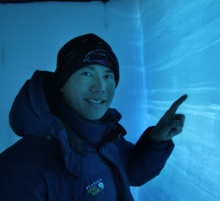
Gifford Wong - Advisory Board
Dr. Gifford Wong (he/him) is currently a Senior Policy Advisor at the California Office of Energy Infrastructure Safety supporting the Wildfire Safety Advisory Board. Prior to working for the state of California, Gifford worked for six years as a Research Staff Member at the IDA Science and Technology Policy Institute (STPI) in Washington, DC. Before joining STPI, he served as a Foreign Affairs Officer in the Office of Chinese and Mongolian Affairs at the U.S. Department of State through a AAAS Science and Technology Policy Fellowship, and as a climate and environment adviser to Senator Sheldon Whitehouse while on an American Geosciences Institute Congressional Science Fellowship. He holds a doctorate in Earth sciences from Dartmouth College, an Honours in Antarctic Studies from the University of Tasmania at Hobart, and a bachelor’s in Asian American Studies from the University of California at Berkeley.
Past Advisory Board Members
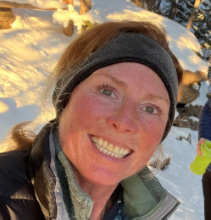
Christine Wiedinmyer - Advisory Board
Dr. Christine Wiedinmyer (she/her) is the Associate Director for Science at CIRES, overseeing the science portfolio of CU Boulder's largest research institute with 600+ scientists. Wiedinmyer is an expert in atmospheric pollutant emissions and their impacts, and has specific expertise on the emissions from fires. Wiedinmyer is a co-founder of the Earth Science Women's Network (ESWN) and still a member of the organization’s Board of Directors. She has been instrumental in growing this volunteer-led organization from a small circle of scientists into an international network of female geoscientists with more than 3000 members. She has mentored many early-career scientists and often speaks publicly about networking, leadership, and geoscience careers.
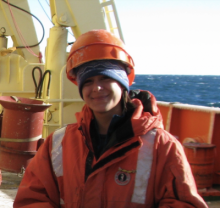
Michelle Guitard - Advisory Board
Dr. Michelle Guitard (she/her) is currently transitioning from academia to industry. In April she will begin as an analytical chemist at Oregon's Wild Harvest, a family owned and operated herbal supplement company in Central Oregon. She is finishing up as a postdoctoral research scientist at Lamont-Doherty Earth Observatory, where she worked to reconstruct Southern Ocean temperature changes during the last 2.5 million years. Her project applied organic geochemical techniques to sediment records to extract and analyze biomarkers, which served as a paleotemperature proxy. Michelle obtained both her Masters and her PhD from the University of South Florida, where she focused on understanding ice-ocean interactions from marine sediment cores collected along Antarctica’s continental shelf.
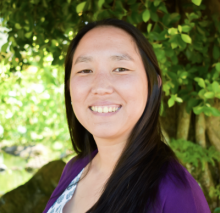
Amanda Timmerman - Advisory Board
Amanda Timmerman (she/her) is a research scientist at Georgia Tech. She earned her BS and MS at the University of Hawaii and her PhD at University of Victoria in Canada. Her research focuses on phytoplankton’s role in biogeochemical cycling and exploring what drives phytoplankton variability. She combines shipboard sampling, satellites and model output to help answer her research questions. She also compares primary production and carbon export methods as a tool to uncover method biases and better constrain the carbon cycle. Amanda has participated in research expeditions to both the Antarctic and the Canadian Arctic.
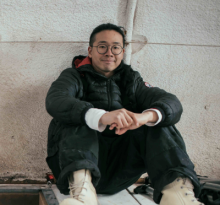
Aaron Toh - Advisory Board
Aaron Toh (they/he) is a Zoology PhD candidate at the University of Hawai’i at Mānoa, where their research focuses on the biology of Antarctic invertebrates. They are specifically interested in the effects of warming on the development of early life history stages, as well as the function and structure of the visual system of giant Antarctic sea spiders. Aaron has spent two field seasons (2019-20 and 2021-22) diving for samples and conducting field research at McMurdo Station, Antarctica. To ensure that polar research continues for decades to come, Aaron is committed to making the field more welcoming for all who wish to pursue rigorous polar science.